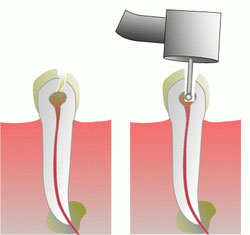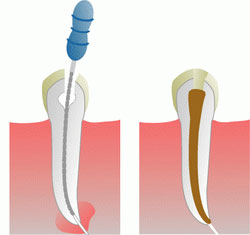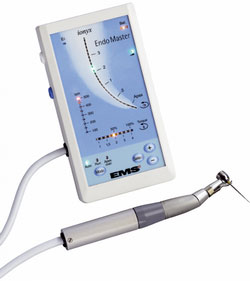Ductive treatment – endodontic
Root canal treatment is caused by deep untreated caries, which often leads to toothache. Initially, this is manifested by the so-called tooth moth, an excessive reaction to stimuli, e.g. warm, cold or sweet meals. Pulp inflammation in the initial stages is possible to cure, while in the absence of conservative treatment at this stage, pulp inflammation passes into an irreversible state. This is manifested by intense spontaneous toothaches and the need for duct altimer treatment – this is the only way to save the tooth. Leaving the tooth without treatment can lead to the formation of inflammatory lesions in the bones much more difficult to treat than ordinary endodontic treatment. Endodontic treatment – colloquially called duct treatment, involves the removal of infected neurovascular tissue of the tooth from the canals and ventricular. It is carried out due to the infection of tooth pulp by bacteria being in caries. What is the course of treatment? Here is a simplified scheme:
- First visit: the dentist performs anesthesia and removes the dental pulp from the canals and the tooth chamber. Then he takes an X-ray to assess the length and course of the tooth canals. After a radiological evaluation, the doctor expands the dental channels and removes bacteria and remnants of the pulp from them. The visit ends with the completion of the dental channels and the execution of another X-ray photo to assess the correctness of the filling of each channel – it is important that the teeth channels are filled with dental material throughout its length. At the end of the visit, the dentist secures the tooth with a tight temporary dressing.
- Second visit: the dentist, taking into account the degree of destruction of the tooth crown, presents the optimal possibilities of rebuilding the treated tooth and together with the patient decides to prepare the tooth for the crown-root insert and put on a porcelain crown or to put on a light-curing UV filling, which ends the treatment.
Faqs:
- Is endodontic treatment painful? – Currently, thanks to good anesthesia, root canal treatment can be carried out completely painlessly. The widespread opinion of the extremely high soreness of canal treatment has roots from a time when effective anesthesia was not widely available and treatments were carried out in full perception by the patient. In our clinic we provide complete painlessness of all dental treatments.
- What is machine root canal treatment? – Machine root canal treatment involves the use of an endodontic micromotor to widen the canals – it allows the use of flexible titanium tools and thus wider and more accurate cleaning of the canals. In our clinic we use the highest quality endodontic device Endomaster Swiss company EMS. This device has a built-in endometer to control the correct depth of the dental ducts during cleaning. This guarantees the highest precision of treatment.
- What is the strength of the tooth after root canal treatment? – teeth treated endodontically usually have quite large defects of their own tissues. In order to strengthen the structure of the tooth and protect it from cracking, it is advisable to make a porcelain crown on the crown-root insert – such a reconstruction provides full strength comparable to the strength of its own healthy tooth before Treatment.
- What is an alternative to root canal treatment? – Unfortunately, the alternative is only to remove the tooth. Leaving the tooth untreated may result in serious complications, e.g. osteoinflammation or its reabsorption. Your own tooth is always more valuable than the best prosthetic reconstruction, so whenever it is possible to carry out duct treatment than to remove the sore tooth.
- Can the tooth still hurt after root canal treatment? – It happens that for a few days after endodontic treatment, the tooth is gently sensitive to biting. Such a symptom occurs very rarely and is not a nuisance. Hypersensitivity if at all it usually subsides spontaneously usually after a few days after treatment.



